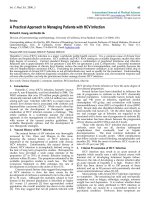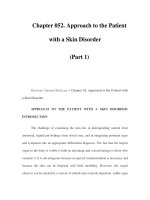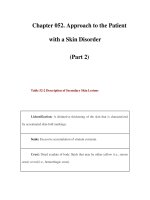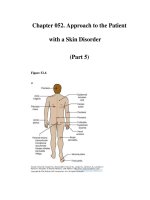Chapter 052. Approach to the Patient with a Skin Disorder (Part 8) pptx
Bạn đang xem bản rút gọn của tài liệu. Xem và tải ngay bản đầy đủ của tài liệu tại đây (53.95 KB, 5 trang )
Chapter 052. Approach to the Patient
with a Skin Disorder
(Part 8)
Tzanck Smear
A Tzanck smear is a cytologic technique most often used in the diagnosis
of herpesvirus infections [herpes simplex virus (HSV) or varicella zoster virus
(VZV)] (see Figs. 173-1 and 173-3). An early vesicle, not a pustule or crusted
lesion, is unroofed, and the base of the lesion is scraped gently with a scalpel
blade. The material is placed on a glass slide, air-dried, and stained with Giemsa
or Wright's stain. Multinucleated epithelial giant cells suggest the presence of
HSV or VZV; culture or immunofluorescence testing must be performed to
identify the specific virus.
Diascopy
Diascopy is designed to assess whether a skin lesion will blanch with
pressure as, for example, in determining whether a red lesion is hemorrhagic or
simply blood-filled. Urticaria (Fig. 52-11) will blanch with pressure, whereas a
purpuric lesion caused by necrotizing vasculitis (Fig. 52-4) will not. Diascopy is
performed by pressing a microscope slide or magnifying lens against a lesion and
noting the amount of blanching that occurs. Granulomas often have an opaque to
transparent, brown-pink "apple jelly" appearance on diascopy.
Figure 52-11
Urticaria. Discrete and confluent, edematous, erythematous papules and
plaques are characteristic of this whealing eruption.
Wood's Light
A Wood's lamp generates 360-nm ultraviolet (or "black") light that can be
used to aid the evaluation of certain skin disorders. For example, a Wood's lamp
will cause erythrasma (a superficial, intertriginous infection caused by
Corynebacterium minutissimum) to show a characteristic coral pink color, and
wounds colonized by Pseudomonas to appear pale blue. Tinea capitis caused by
certain dermatophytes such as Microsporum canis or M. audouini exhibits a
yellow fluorescence. Pigmented lesions of the epidermis such as freckles are
accentuated, while dermal pigment such as postinflammatory hyperpigmentation
fades under a Wood's light. Vitiligo (Fig. 52-12) appears totally white under a
Wood's lamp, and previously unsuspected areas of involvement often become
apparent. A Wood's lamp may also aid in the demonstration of tinea versicolor and
in recognition of ash leaf spots in patients with tuberous sclerosis.
Figure 52-12
Vitiligo. Characteristic lesions display an acral distribution and striking
depigmentation as a result of loss of melanocytes.
Patch Tests
Patch testing is designed to document sensitivity to a specific antigen. In
this procedure, a battery of suspected allergens is applied to the patient's back
under occlusive dressings and allowed to remain in contact with the skin for 48 h.
The dressings are removed, and the area is examined for evidence of delayed
hypersensitivity reactions (e.g., erythema, edema, or papulovesicles). This test is
best performed by physicians with special expertise in patch testing and is often
helpful in the evaluation of patients with chronic dermatitis.
FURTHER READINGS
Dermatology Lexicon Project: www.futurehealth.rochester.edu/dlp2/
James WD et al: Andrews' Diseases of the Skin: Clinical Dermatology,
10th ed. Philadelphia, Elsevier, 2006
Wolff K et al (eds): Fitzpatrick's Dermatology in General Medicine, 7th ed.
New York, McGraw-Hill, 2008









